Juncker Threw the Gauntlet to the Member States with the Investment Plan
Adelina Marini, December 5, 2014
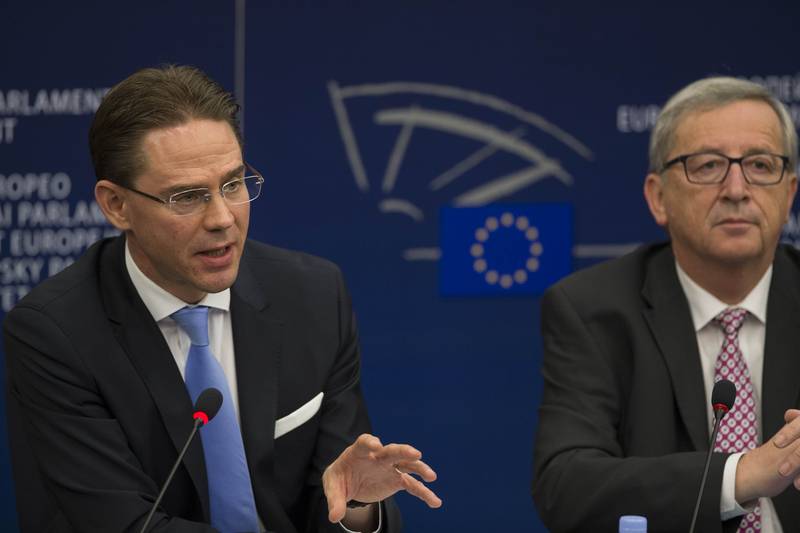 The new president of the European Commission Jean-Claude Juncker has pulled the bull's horns by challenging the European Parliament, the member states and the business. On 26 November he presented the long-awaited investment plan which has turned into a central topic for the new Commission. And as there was a risk the plan to be both one of the main reasons for the approval of his Commission but also the main reason for his failure, Juncker applied smart tactics. Instead of following the traditional model of presentation of big ideas and proposals first in front of journalists in Brussels, he went with his entire Commission to Strasbourg and in the middle of an intense and an unusual plenary session presented his plan. From the European Parliament's rostrum, only a day after the MEPs were addressed by Pope Francis with a strong focus on the economy, Jean-Claude Juncker threw the gauntlet to the member states.
The new president of the European Commission Jean-Claude Juncker has pulled the bull's horns by challenging the European Parliament, the member states and the business. On 26 November he presented the long-awaited investment plan which has turned into a central topic for the new Commission. And as there was a risk the plan to be both one of the main reasons for the approval of his Commission but also the main reason for his failure, Juncker applied smart tactics. Instead of following the traditional model of presentation of big ideas and proposals first in front of journalists in Brussels, he went with his entire Commission to Strasbourg and in the middle of an intense and an unusual plenary session presented his plan. From the European Parliament's rostrum, only a day after the MEPs were addressed by Pope Francis with a strong focus on the economy, Jean-Claude Juncker threw the gauntlet to the member states.
Initially, he promised to present his plan before Christmas but, as he said in front of the MEPs, "this year Christmas has come early". The reason is that Juncker wants the member states to discuss the plan at their final EU summit on 18-19 December in Brussels. He decided to present his plan two days before the Commission launched the new European Semester, part of which are the country-specific recommendations of the member states what structural reforms they need to do and also the analysis of the draft budgets of the euro area member states for the coming year. In this way, he clearly distributed the roles so that his plan can be successful.
The structural reforms from you, the investments from us
Currently, the Union is facing an odd paradox. On the one hand, the interest rates are at record low levels, the ECB has ensured abundant liquidity but, still, the economy is hardly moving and investments continue to be at the same low level as in the beginning of the crisis. The reason for this paradox is in the member states who are trying to keep national control over highly integrated and globalised economy. Some are undertaking structural reforms and attract investments, others delay the reforms or do them partially and the effect is a lack of investment interest. That is why, Juncker said in Strasbourg last week: "[...] geographical silos will not serve anyone. France growing is good for Italy. Southern Europe growing is good for Germany. We are all in this together. Our fates are linked. We should stand shoulder to shoulder".
This can happen only if the EU stands steadily on three pillars: structural reforms, fiscal discipline and investments. Juncker's plan points out very clearly that the member states and regional authorities have a key role to play in the implementation of the structural reforms, in fiscal responsibility, ensuring regulatory certainty and boosting investments in support of employment and growth. Those who have fiscal space for manoeuvres should invest more. Those are the countries with low levels of budget deficit and public debt. The countries with limited fiscal space should prioritise better, should plan better their investments and spending, should take better advantage of the EU funds and should create favourable investment environment. According to the Commission, a lot can be achieved at national and regional level.
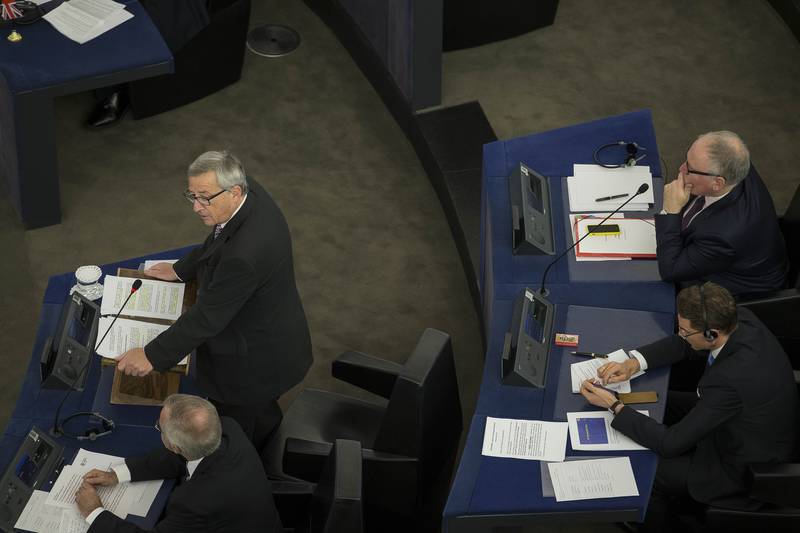 The Commission commits to steer and monitor progress under the European Semester. Although the it will take all the negatives from a possible failure of the plan, in fact the ball is in the member states' courtyard. Why? Because the European Commissions data show that many of them have problems that no supra national plan can resolve on their behalf. Since the beginning of the last decade, the level of investments in the EU's powerhouse - Germany - has been significantly lower than in the rest of the euro area, although in the past years this is changing. This is in contrast with the good conditions, like healthy corporate balance sheets and low interest rates. According to the Commission, the persistently low interest rates of companies and the government can harm Germany's economic growth in the long-term. And this is already a fact because of the geopolitical situation. The Commission recommends improvement of the business environment and education. Areas appropriate for investment in Germany, according to the Commission, are the transport infrastructure and investments at local level.
The Commission commits to steer and monitor progress under the European Semester. Although the it will take all the negatives from a possible failure of the plan, in fact the ball is in the member states' courtyard. Why? Because the European Commissions data show that many of them have problems that no supra national plan can resolve on their behalf. Since the beginning of the last decade, the level of investments in the EU's powerhouse - Germany - has been significantly lower than in the rest of the euro area, although in the past years this is changing. This is in contrast with the good conditions, like healthy corporate balance sheets and low interest rates. According to the Commission, the persistently low interest rates of companies and the government can harm Germany's economic growth in the long-term. And this is already a fact because of the geopolitical situation. The Commission recommends improvement of the business environment and education. Areas appropriate for investment in Germany, according to the Commission, are the transport infrastructure and investments at local level.
Ireland, which sustained a strong shock after the bust of the construction and banking bubbles, is one of the few investment champions in the EU. In spite of the drops due to the crisis, the investment flows have been maintained mainly due to the country's capability to attract foreign investments. Even during the adjustment programme, Ireland managed to keep its attractiveness for foreign direct investments. For the first semester of 2014, investments in the country rose by 11.3% year-on-year. The most attractive sectors for investments are the pharmaceuticals, ICT, financial services. According to the Commission, the construction sector in Ireland also has a potential for investments, although the country endured the bust of a construction bubble which created high unemployment.
Latvia, too, is an interesting example in EU because it is one of the few rapidly growing economies but in the same time it suffers from a loss of investments. This is due to the geopolitical tensions, the Commission explains. The biggest challenge for the country are the low level of public investments in sectors where there are no stimuli for private investments. Latvia is thirsty for investments in the transport and energy infrastructure. It needs investments in electrical and gas networks to improve the security of deliveries and its connectivity with the EU markets, the Commission says.
Bulgaria, which was formerly a magnet for foreign direct investments, is in quite a poor situation, according to the Commission. As a share of investments in the gross domestic product, Bulgaria is at the level of other similar economies in the EU but since 2009 there is a significant decline. This is due to the continuing deleveraging and the low profit expectations. The uncertainty of the banking sector, the persistent weaknesses of the business environment, the high number of non-performing loans are part of the reasons why there is no investment interest. In the same time, the Commission points out that Bulgaria has significant investment needs. The country is the least energy efficient economy in the EU in terms of industry, transport and housing. It also needs roads, railways, energy interconnectors. It needs investments for building gas networks to improve the security of deliveries and its connectivity with the rest of the EU. The improvement of the business environment, of the public procurement system and of the energy market are part of the country-specific recommendations this year.
Against this backdrop, neighbouring Romania makes a really good impression. The level of investments, supported also by EU funds, has a 25% share in the GDP which is much higher than the EU average of 18% of GDP. This reflects the development of a production capacity in Romania and the high level of public investments. However, the country can do much better if it solves the problem with the bad bank balance sheets and the high level of non-performing loans which hamper the credit growth in the private sector. The Commission recommends also a more stable tax policy and better business environment.
The plan
In addition to what the member states have to do with the assistance of the Commission, in the investment plan it is also proposed to establish a new fund - a European Fund for Strategic Investments (EFSI). The main purpose of the fund will be to finance high risk long-term projects by taking the "first loss" and thus stimulate private investments. The Commission proposes to put in the fund 16 billion euros in the form of guarantees in addition to 5 billion euros which the European Investment Bank will put on the table as it will be the institution that will multiply the money. On the basis of the bank's experience, the Commission has estimated that the 21 billion euros (16 + 5) could accumulate 315 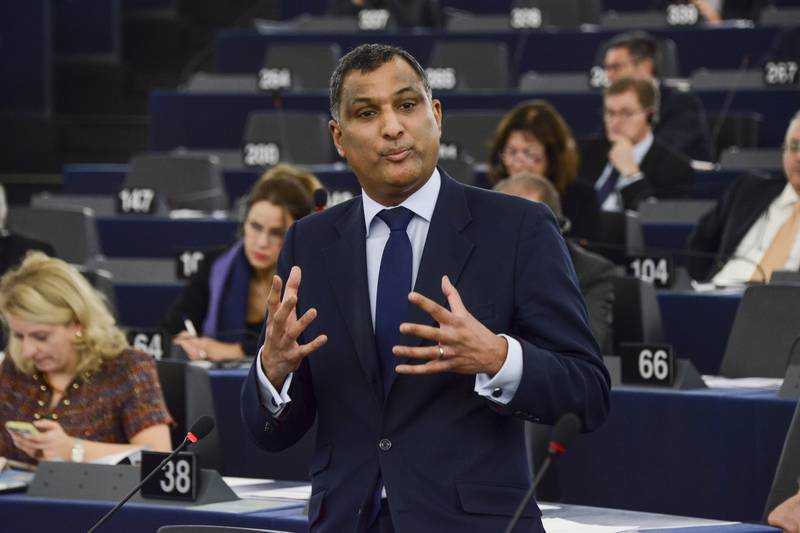 billion euros of investments. In other words - each euro of public money could deliver 15 euros of investments.
billion euros of investments. In other words - each euro of public money could deliver 15 euros of investments.
Eight billion of the 16 billion of guarantees the Commission proposes to be taken from the three new headings in the common EU budget for 2014-2020. From the Connected Europe facility the Commission proposes to be redirected 3.3 billion euros, from the programme for financing projects in support of research and innovation Horizon 2020 it proposed to take 2.7 billion euros and another 2 billion will come from budget reserves. The Commission claims that this money is not currently engaged in projects but can be used for the same projects but through the fund. These headings are new in the EU's multiannual budget of which Barroso's Commission used to say that it is in fact the EU's investment tool. Juncker's Commission, however, wants a new approach - instead of subsidies and grants, the European economy to start gradually tuning to loans and guarantees. As Juncker says - to put Europe back to work.
The Commission proposes the fund to be established as soon as possible with a special regulation which will be ready in January so that it can be approved ambitiously by June 2015 when it is expected to be operational. The envisaged lifetime of the fund is three years, but if it is successful its life could be prolonged. Will it succeed to generate 315 billion euros of investments which are equal to 2% of the total GDP of the EU for the next three years will depend on how will the plan be implemented. The amount could be bigger if the member states join in with contribution of their own. This means to pay additional contribution to those they already pay in the common budget.
The Commission has left open the question how can that happen but it proposes the countries that decide to join in financially to get a "more favourable" attitude under the excessive deficit and debt procedure. This means that if a member state provides money to the fund and that weighs on its budget deficit or debt the Commission will not take it into account. This was one of the demands of Italy's Prime Minster Matteo Renzi - money for investments not to be calculated in the budget deficit and debt. However, this is in contradiction to the claim that the investment plan avoids new debt. Another option for participation of the member states is through their promotional banks. But as they have a different status in the different member states this is yet to be discussed and for now there is no clear answer how exactly can they be used. Nonetheless, their role is broadly mentioned in Juncker's plan.
The fund will have a governing structure of its own which will be governed by a board of experts, The specific projects will be approved by a special independent investment committee, but the European Commission will keep its leading role in the selection of the projects because the purpose of the fund is to support strategic investments which are of European significance. Those are mainly transport infrastructure, broadband internet and energy grids. Also important areas are education, research, energy efficiency and renewable energy. The Commission emphasises very much on the supra-nationality of the projects and stands firmly against "fulfilling the member states' wish lists". There will be no thematic or geographical scopes in the approval of the projects to ensure that only those that have a real value will be selected.
This is one of the greatest challenges for the success of the plan because some member states that are especially dependent on the EU funds as a main source of investment could feel deprived and could refuse to support the fund. This is the worst scenario. A better scenario is if they only refuse to take part with additional money. Whatever they would decide, however, the Commission recommends them to set aside a certain percentage of their allocations in the already approved Partnership Agreements for key investment areas. For instance, 50% in support of small and medium-sized enterprises, 20% for efforts to reduce CO2 in the atmosphere, 10% for ICT, another 10% for sustainable transport, 5% in support of research and innovation and another five percent for the environment.
For the better selection of the quality of the projects the Commission proposes to establish a special task force which is supported by the Council as well. The question is whether this support will be only in words. European Commission experts say that one of the problems in the EU is that there are many good projects which the investors have no idea of or are not capable, due to their complexity, to estimate their potential returns. That is why, the Commission will make a list of all the projects that are worth investing in on the basis of several simple and known economic criteria. They are yet to be published.
Nothing is possible without the single market
No matter how good the plan could be, it cannot achieve its goals unless the single market is completed of which urged MEPs during the debate after the presentation of the plan on 26 November in Strasbourg. According to the Commission, the single market is Europe's greatest structural reform. This plan needs liberalisation and unification of our markets, said Guy Verhofstadt, leader of the group of Liberals in the EP. If we continue to have 28 separate digital regulators you can forget about your  broadband, he said. It is necessary to complete the market of services, the digital market and the energy market. Otherwise, the plan will fail.
broadband, he said. It is necessary to complete the market of services, the digital market and the energy market. Otherwise, the plan will fail.
The European Commission's Vice President, Jyrki Katainen, responsible for the investment plan, agrees with this opinion. He said that the single market needs deepening in the area of services and public procurement. He added that he will work with all the commissioners to complete the energy, digital and transport markets and also for the new idea for a capital union. "For me, this Single Market dimension – the third side of the triangle - is the most important part of our work and the one that can really change Europe permanently", Mr Katainen said. The problem is, however, that there has been talk about completion of the single market for years, but the measures the member states are undertaking are highly insufficient. Moreover, due to the crisis, the reverse process can be observed - of restriction of certain markets.
Both Jyrki Katainen and his boss Jean-Claude Juncker underlined several times that the investment plan is not a magic wand that will change Europe overnight. This plan is only a part of a common strategy. The other two elements are much more important - structural reforms and fiscal discipline. The money in itself will not help solve our problems. Investors are returning to Europe, but not everywhere. They are coming back in Portugal, in Ireland. Why? Because these countries have engaged in structural reforms and undertook the necessary steps to transform their societies, said the leader of the biggest political group in the EP - EPP - Manfred Weber (Germany). The court proceedings are so long in Italy that investors give up. The situation is not less complicated in France or even in Germany, he added. According to the Commission, for instance, in Slovenia the lack of investments is due mainly to the high indebtedness of the corporate sectors and the significant state involvement in the economy. In the same time, Slovenia has highly skilled labour force and knowledge based economy.
Guy Verhofstadt also underscored that the investment plan cannot be viewed separately from the structural reforms. He even proposed to add conditionality. What is the point to finance projects in countries that make no effort to make structural reforms? To me, conditionality can be on the table by the beginning of next year, the former premier of Belgium added and was applauded for that. Verhofstadt's group came up with a plan of its own which envisages the issuance of investment future bonds, tax stimulus for households and the small and medium-sized enterprises and opening of markets. "Others say we need more debt. We do not. National budgets are already stretched. The EU operates on balanced budgets and the abundant liquidity can allow Europe to grow without creating new debt. We will not betray our children and grandchildren and write more checks that they will ultimately have to pay off", Juncker told the MEPs.
Phillip Lamberts (Belgium) from the group of Greens and the European Free Alliance warned, however, against the investment fund turning into a means to finance the casino economy. Currently, the ECB is injecting one billion in the economy but only 5% of it goes to the real economy and the rest 95% goes in the bubble economy, he said and called to invest in energy security. "We cannot afford ourselves to throw one billion to Vladimir Putin and his energy systems", the Belgian MEP concluded.
For now the plan is accepted positively by the member states. France and Germany have even announced they will come up with specific proposals in mid-December. ECB President Mario Draghi also supported the plan saying that it can restore the economic growth. He warned, though, that at this stage this is the only initiative the EU has. Mr Draghi reiterated that the key is structural reforms. According to him, the structural reforms now have the same strong spillover effect as the budgetary plans and have a dominating role to produce economic growth. But still, we are not here to tell the governments what to do, he said.
Juncker's plan will be discussed by the EU finance ministers on 8 December. It will be a substantial part of the discussions at the EU summit on 18-19 December. It is not so important if they will support it because as things stand it seems they will. More important is if they will work for it. Some ground for doubts gives the experience with the rules of the reformed economic governance. EU and the member states in particular spent many sleepless nights in reforming the EU's economic governance racing with the financial markets who were waiting in blood for the even smallest mistake or wrong message to "bite" the next country, thus pulling out another brick from the wall of the common currency.
The minute the market pressure stopped and recovery emerged on the horizon some member states started to try avoiding reforms. The best example is France which, together with Italy and Belgium, received additional time by March to correct its budget according to the fiscal discipline rules. In addition to the reluctantly reforming countries is also the rise of anti-European political parties in EU. According to Open Europe, a British reformist think-tank, the vulnerable governments in Europe are becoming more and more. Spain, Greece, Denmark, Italy, Britain and The Netherlands suffer from a significant rise of influence of the anti-European parties. To this group we should add France as well. The latest victim is Sweden where the anti-immigration party Swedish Democrats is capable of causing early elections because it refused to support the budget of the new government of PM Stefan Lofven.
During the short debate on Juncker's plan, the anti-European groups and MEPs focused mainly on attacking the euro instead of speaking on the substance. Patrick O'Flynn (UK) from Nigel Farage's Europe of Freedom and Direct Democracy group spoke of the evils of the euro and the "imperial ambitions" of the EU which robbed the people of the chance to achieve their dreams. Gerolf Annemans, an independent MEP from Belgium, said that the proposed package was an absolute farce that recycles and relabels something old. Those are monopoly money, he added. The European Conservatives and Reformists, consisting to a large extent of David Cameron's Conservatives, again took a neutral position, asking more questions than debating on the substance. The leader of their group, Syed Kamall asked how will the plan make sure that the countries will do reforms and why the non-euro area countries are 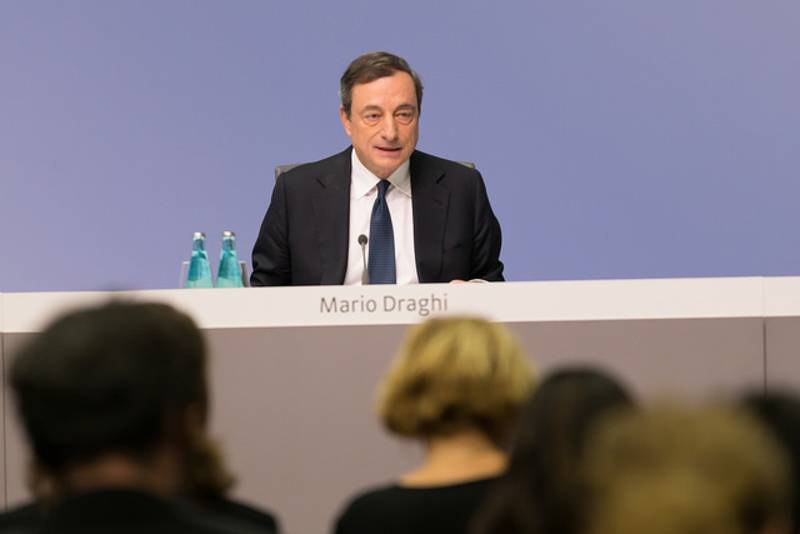 more attractive for investors than the eurozone. He said that his group's support will depend on the answer of the question why the private sector does not invest.
more attractive for investors than the eurozone. He said that his group's support will depend on the answer of the question why the private sector does not invest.
The ball is now in the hands of the member states. They can give the investment plan a chance not by approving it at their summit in two weeks, but by undertaking serious reforms. These reforms can save them also from the attacks of the populist eurosceptic parties. Mario Draghi assured this week that this does not mean a loss of national sovereignty but it is sharing national sovereignty at supranational level. Europe, indeed, has a last chance because if it fails to unite for the sake of prosperity, its existence will lose purpose. "This is the challenge of a generation. Europe will have to face it head on. Money will not fall from the sky. We do not have a money printing machine. We will have to attract money and make it work for us. Today we are setting up a new architecture that will make this possible", the president of the European Commission pointed out, The gauntlet has been thrown. Now it is up to the European Council.
 Klaus Regling | © Council of the EU
Klaus Regling | © Council of the EU Mario Centeno | © Council of the EU
Mario Centeno | © Council of the EU Mario Centeno | © Council of the EU
Mario Centeno | © Council of the EU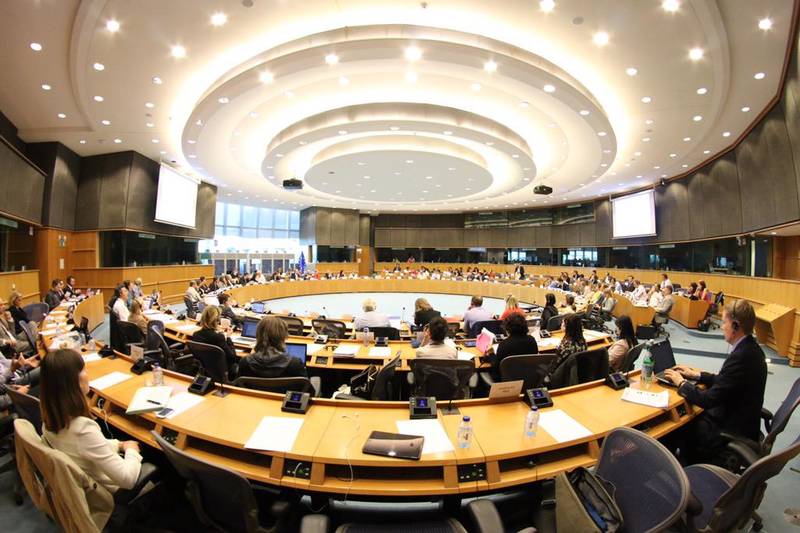 | © European Commission
| © European Commission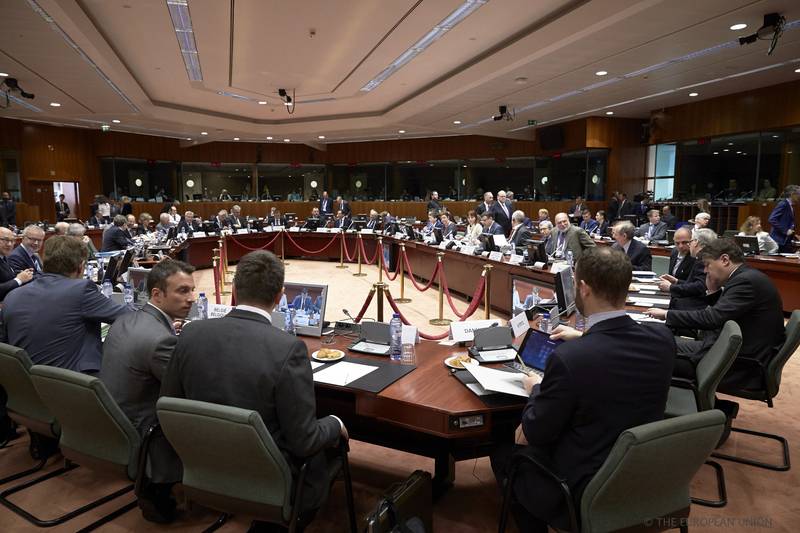 | © Council of the EU
| © Council of the EU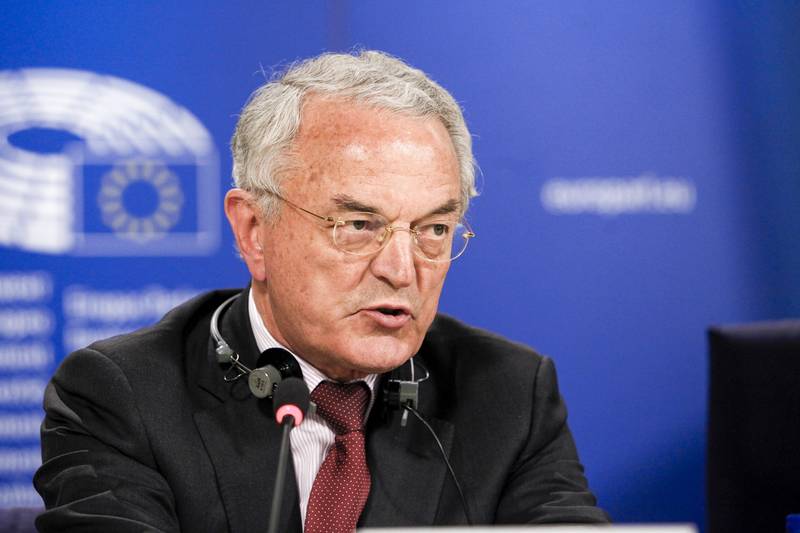 Jean Arthuis | © European Parliament
Jean Arthuis | © European Parliament